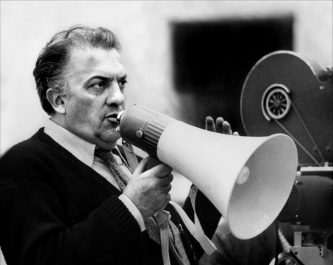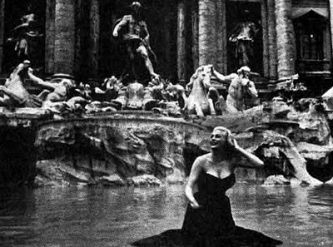GUEST POST OVERVIEW: Federico Fellini is one of the most important, if not the most, Italian film directors in history. His comedy films perfectly depict Italy’s society after the war and his films won many international awards, including many Oscars.

Italian culture is famous around the world for many reasons, whether it’s the gastronomy, the open character of the Italians or their laid back approach to life and the beautiful views of the Eternal city from our Rome apartments. There is no better way to understand Italy, its society and its culture than by watching the films of the great Italian film director Federico Fellini.
Fellini was born in the coast town of Rimini in 1920 and as a young man managed to avoid being drafted into the Italian army thanks to working in a radio station. After the war he collaborated with the famous Italian film director Roberto Rossellini and that was his initiation in the world of film directing. In 1956 he was awarded his first Oscar for Foreign Film for ‘La Strada’ a film about a young naive Italian girl who is sold to a British showman.
This is just one of the films that Fellini directed in his Italian post-war neo-realism period, followed by ‘Nights of Cabiria‘ (1957), which also got an Oscar in 1958. During this time, Fellini was severely depressed and this impacted on his directing, even though he was helped by his wife Giulietta Masina, the star of ‘Nights of Cabiria’.

However, his next film was a turning point in Italian film and his career. ‘La Dolce Vita‘ was a total hit in the film world. It tells the story of Marcello, a young journalist with plenty of street knowledge that moves around Rome’s elite society as he tries to become a serious and reputable writer. This film was a perfect depiction of Rome’s society in the 1950s and 1960s, glamorous Rome where film stars were rife due to how cheap it was for Hollywood to film in Rome. Of course, Italian women are famous around the world for their beauty and glamour and this didn’t go unnoticed to Fellini, whose female characters are a key part of the charm of Fellini’s films, providing a sexual figure in the eyes of lusting men but who were much more than just that, women such as Giulietta Masina, Claudia Cardinale, Anouk Aimée or Anita Ekberg. Fellini’s films showed a society of luxury and excesses that was rebuilding itself after the ruins left by the war.
A film that shows the city of Rome perfectly is, surprise surprise, his film ‘Roma’ (1972) which shows different stories that took place in the Eternal City during the war in the 1940s and then after the war in the 1970s, alternating the scenes of different times. The beauty of this film is that it doesn’t really have a plot or a protagonist, instead the city of Rome itself being the main focal point in it. The everyday scenes that we see in ‘Roma’ from the different times can give us a great idea of what Italian and Roman culture is like in a comedy tone, with funny events happening in big family meals in the street and in the individual stories. This film is Fellini’s own account of his arrival in Rome during the war and then his return in the 70s, in other words, Rome through the eyes of the great Federico Fellini.
Trace back the steps of the great Federico Fellini by renting apartments in Rome and experiencing true Italian culture and its people. You will feel immersed in the director’s unique world, an experience that you will never forget.
About the Author: Aleix Gwilliam is a 24 year old from Barcelona who looks English but thinks like a Catalan. He enjoys travelling, especially on old Czech trains, and trying to start conversations in Hungarian with people at Pecs station, even though his Hungarian is as good as his Bulgarian, in other words, not very good. He’s a trier.
EXPLORE SOMEWHERE NEW
Nothing found.
BUY A PRINT
All photos on this site are available as limited edition fine art photographic prints. Please get in touch for sizes and rates.

